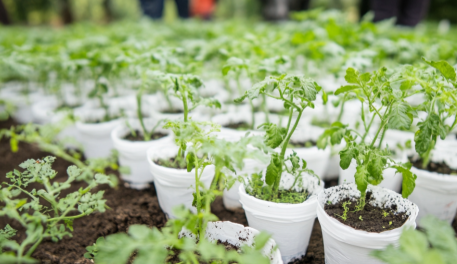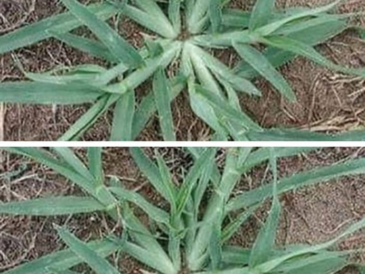In the ever-evolving world of organic gardening, where the emphasis is on creating a healthy, chemical-free environment, baking soda stands out as a humble yet powerful tool. Known scientifically as sodium bicarbonate, this common household item offers a wide range of benefits, from disease prevention to improving the taste of your garden’s bounty. Whether you’re battling pests or striving to grow healthier plants, baking soda can be an invaluable ally.
🌱 Why Baking Soda?
Baking soda’s appeal lies in its simplicity, effectiveness, and affordability. Unlike synthetic chemicals, it’s safe for humans, pets, and plants, making it a popular choice for gardeners aiming to maintain an organic and sustainable garden. Its alkaline nature works wonders in balancing acidic soils and protecting plants from harmful fungi and pests. Let’s explore why baking soda should be a staple in your gardening routine:
- Disease Prevention:
Baking soda is incredibly effective at combating fungal diseases, such as potato blight, which can decimate crops if left unchecked. By creating an alkaline environment on plant leaves, it inhibits the growth of fungal cells, making it harder for diseases to take hold. This is particularly useful for tomatoes, cucumbers, and squash. - Natural Pest Repellent:
When applied correctly, baking soda acts as a natural insect deterrent, keeping pesky bugs away from your plants without relying on harmful pesticides. This keeps the delicate ecological balance of your garden intact while ensuring your crops remain pest-free. - Improved Plant Health:
A regular application of baking soda solutions can strengthen plants, making them more resilient to environmental stressors like temperature fluctuations and common garden diseases. Additionally, it can improve the flavor of fruits and vegetables like tomatoes, making them taste sweeter and more vibrant.
🌿 The Multifaceted Benefits of Baking Soda in the Garden
Let’s take a closer look at some of the powerful ways baking soda can transform your garden:
🍅 Disease Prevention:
Baking soda’s antifungal properties are highly effective in preventing diseases such as powdery mildew, black spot, and early blight. By creating an alkaline layer on plant surfaces, it disrupts the growth of harmful fungi that thrive in acidic conditions. This makes baking soda particularly useful for tomatoes, roses, and vine crops.
🐛 Pest Repellent:
The fine particles of baking soda can deter insects like aphids, ants, and spider mites. When pests come into contact with baking soda, it disrupts their cell membranes, eventually killing them, all while being completely non-toxic to humans and pets.
🌿 Enhances Plant Health and Growth:
Baking soda helps neutralize overly acidic soils, which can harm plant roots and hinder growth. When properly balanced, plants grow stronger and produce healthier fruits. Regular application to plants like tomatoes can also enhance their flavor, giving you sweeter, more delicious crops.
🧪 Crafting the Perfect Baking Soda Solution
To make the most of baking soda in your garden, follow this simple recipe for an effective, all-natural garden spray:
Baking Soda Spray Recipe:
- 1 tablespoon baking soda
- 4 liters (1 gallon) of water
- A few drops of organic soap (helps the solution adhere to plant surfaces; use plant-based soaps like goat’s milk soap for chemical-free application)
- 1 tablespoon vegetable oil (helps the solution stick to leaves longer)
Directions:
- Mix all ingredients thoroughly in a spray bottle.
- Shake well before each use.
- Spray the solution generously on plant leaves, ensuring both the top and bottom surfaces are covered.
This environmentally friendly solution is ideal for regular use and is perfectly aligned with the principles of organic gardening.
🍂 Preventive Measures: Beyond the Spray
While baking soda spray is an excellent remedy for disease prevention and pest control, it’s equally important to incorporate preventive care into your gardening routine. Here are some additional tips:
🌱 Avoid Soil Contact:
To prevent fungal spores from infecting your plants, make sure the lower leaves of plants, such as tomatoes, don’t touch the soil. Use mulch to create a barrier and protect the plant.
🧵 Proper Tying Techniques:
When staking plants, avoid using organic ropes, as these can harbor fungi. Instead, use plastic ties, which are resistant to rot and won’t contribute to the spread of diseases.
☀️ Timing Is Everything
Baking soda treatments are most effective when applied during the cooler parts of the day—either in the early morning or late afternoon. This minimizes the risk of leaf burn caused by the combination of sunlight and the baking soda solution. Applying the solution under overcast conditions is another great way to ensure your plants absorb the treatment without the risk of damage.
🌍 A Sustainable Choice for Your Garden
By incorporating baking soda into your gardening practices, you not only embrace a chemical-free approach but also contribute to sustainability. Baking soda is affordable, eco-friendly, and widely available, making it an ideal choice for gardeners seeking harmony with nature. This simple solution helps you produce healthier plants, improve crop quality, and foster a more fruitful garden—all without harming the environment.
In Conclusion: The Organic Gardener’s Best Friend
Baking soda is an incredible, multifunctional tool that empowers gardeners to manage diseases, repel pests, and grow healthier plants. Its simplicity, affordability, and safety make it an indispensable asset in any organic garden. By adopting baking soda as part of your regular gardening regimen, you take a step towards a more sustainable, eco-friendly, and productive garden.
Remember, the secret to successful organic gardening lies in working with nature—not against it. 🌻🌱




